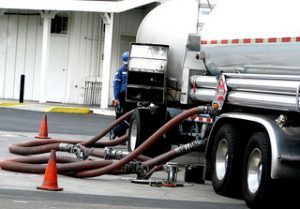
As the gas shortage continues, people are finding new ways of determining where and when retail gas outlets will be receiving fuel. Life here switched from focusing on our normal daily activities to one of constantly assessing our vehicle’s fuel gauge and gambling when, where, and if we will be able to fill up again. Each trip is carefully considered and weighed against some personal measure of importance. Those returns to Target? Perhaps they can wait. Going to work, taking the kids to school, and grocery shopping? Absolutely must dos, but perhaps we’ll try to combine all three trips into one. So, if this much thought is going into how we use our gas, when do you suppose someone first considered how to get access to the fuel you have stored in your company’s fuel tanks?
Normally, filling up our cars is taken for granted. We don’t even consider the question of IF we’ll be able to get gas. Even a couple of years ago when gas prices flirted with $5 a gallon, we never questioned IF; we questioned WHY, as in WHY does it cost $5 a gallon, or WHY did I buy a vehicle that gulps gas instead of one that sips it? However, when gas is in short supply and when we start to wonder IF we’ll get gas again and how our livelihood will be impacted, different protective and survivalist parts of our personality emerge. We get aggressive and creative, and we look for ways to ease the impact on our livelihood.
There are countless stories of fist fights, tempers flaring, shouting matches, and police intervention among otherwise peaceful people over the simple act of filling up a vehicle’s gas tank all because they don’t know IF there will be gas tomorrow, IF they can run the generator tonight, IF they will get to work and the grocery store, and WHERE will they get more gas? So, the question is, to otherwise honest people, during a time of crisis like this, how attractive is that gasoline in those unmanned, unmonitored, underground gasoline fuel tanks you own and operate to fuel your fleet vehicles?
I’m not trying to suggest everyone is a thief and disreputable. However, desperate times do call for desperate measures, and 5 gallons of gas that the company won’t miss will certainly keep that car or generator going for a little longer. Perhaps you’re the type of person who opens the company tanks to your neighbors to help during a time of need like this. That’s incredibly generous and admirable. Shouldn’t it be on your terms, though?
Perhaps I’m being cynical. Perhaps. But I have heard firsthand accounts of municipal fuel finding its way out of the tanks and into a few gas cans as municipal workers eased their financial burden under $5 a gallon for gas. Managers even knew it was happening, but they had no system in place to prevent it and no means to catch those helping themselves without manning the facilities 24/7.
There is a simple and effective way to protect your fuel assets, reduce temptation, eliminate walk off loses, establish accountability, and ensure that decisions of how, who, and what gets fueled lay in the hands of decision makers. An electronic fuel management system, such as a FuelMaster system, can ensure your fuel only goes into vehicles authorized to receive fuel from your tanks, and maintain a detailed and accurate record of exactly where that fuel went. Think of a fuel management system as an insurance policy for your fuel. You may not have ever needed it before, but when you do need it and don’t have it, you’ll wish you made the investment.
Photo Credit: Rennett Stowe
